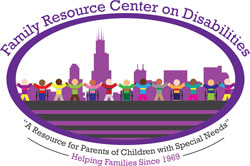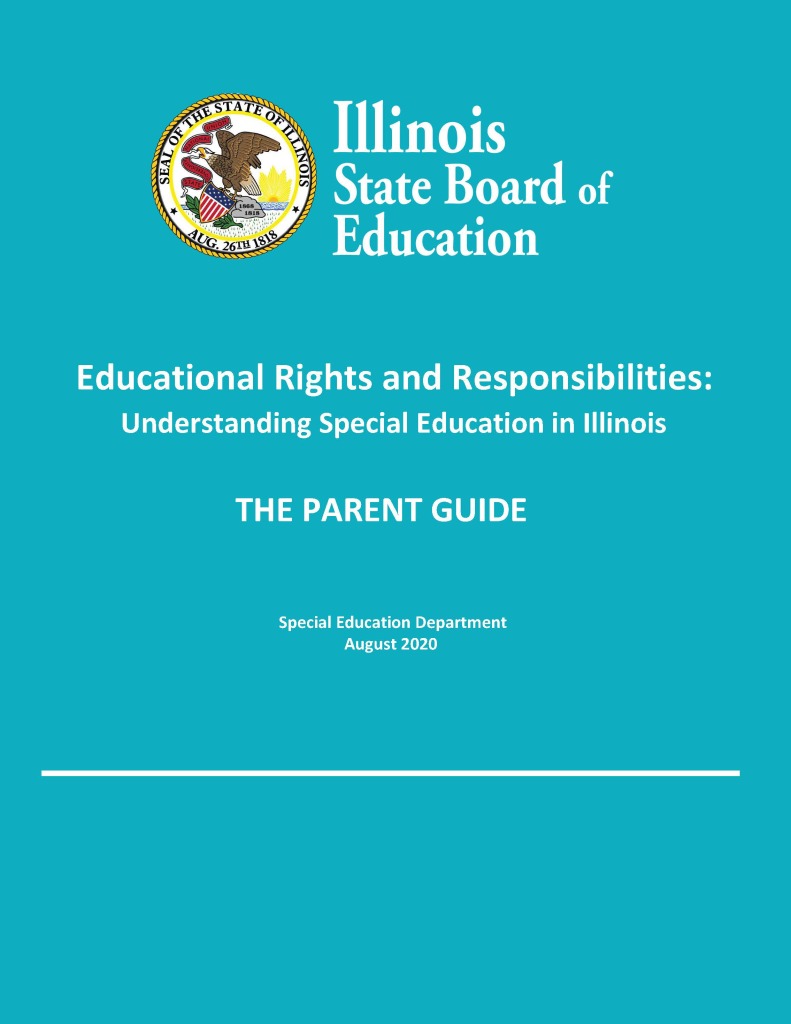Disability Laws
Understanding Special Education in Illinois
Illinois State Board of Education document on Educational Rights and Responsibilities: Understanding Special Education in Illinois developed for parents and others to learn about the educational rights of children who have disabilities and receive special education services. Parent Guide PDF Download
Learn the definition of child find and the difference between screening and evaluation.
Chapter Two: Multi-Tiered System of Supports
In this chapter you will:
- Learn the three parts of the MTSS process
- Learn about progress monitoring and data collection
- Understand the role of parents in the process
- Learn that parents can request a special education evaluation at any point in the intervention process
Chapter Three: Referral and Evaluation
In this chapter you will:
- Learn what “date of referral” means
- Learn the timelines for the school to make a decision about conducting an evaluation
- Understand what areas or “domains” are assessed when an evaluation is conducted
- Learn how often the district must conduct a reevaluation
- Get information on independent educational evaluations
Chapter Four: Eligibility Categories
In this chapter you will:
- Learn the different special education categories
Chapter Five: Additional Procedures for Specific Learning Disabilities
In this chapter you will:
- Learn the criteria required to determine whether a child has a specific learning disability
- Learn how all Illinois districts may use response to scientific, research-based interventions or a multi-tiered system of supports as part of the special education evaluation process to determine if a student is eligible for services due to a specific learning disability
Chapter Six: Individualized Education Programs IEP
In this chapter you will:
- Learn the parts of an IEP
- Learn who is on an IEP team
- Discover tips and things to remember when working on the IEP
- Understand the additional requirements the team must con- sider when writing an IEP for a student who has an autism spectrum disorder
- Learn that changes can be made to an IEP without a meeting
- Know what “prior written notice” is and learn when schools are required to provide it
- Learn what happens if a parent revokes consent to provide special education to a student
Chapter Seven: Least Restrictive Environment
In this chapter you will:
- Discover what an educational placement is and what some of the options look like
- Find out what research says about inclusive education
- Learn the definition of the general education environment
Chapter Eight: Secondary Transition
In this chapter you will:
- Learn what is included in a transition plan
- Get information about questions to ask the student to help in planning for his or her future
- Find out about the transfer of rights at age 18
- Learn about the Delegation of Rights form and where to complete it
- Find out what happens if the student receives a regular diploma
- Learn about student participation in a graduation ceremony while maintaining the right to continue special education services
- Acquire information on student participation in the home-based support services program authorized by the Developmental Disability and Mental Disability Services Act
Chapter Nine: Behavioral Interventions
In this chapter you will:
- Learn what a functional behavioral assessment (FBA) is and how it is used
- Find out what a behavioral intervention plan (BIP) is and what it should include
- Learn what behavioral interventions are permissible during instances of imminent danger to a student or others
Chapter Ten: Student Discipline
In this chapter you will:
- Learn about how school safety affects student discipline
- Understand the procedures involved when a school district considers suspending or expelling a student with a disability
- Learn the process for conducting an expedited due process hearing
Chapter Eleven: Conflict Resolution
In this chapter you will:
- Discover a list of key terms
- Identify steps to take when disagreements occur
- Learn about mediation
- Find out about the formal dispute resolution procedures involved with state complaints and due process hearings
Chapter Twelve: Private Schools
In this chapter you will learn about:
- The definition of “private school”
- The rights and responsibilities of students and parents in private schools
- Placement in nonpublic facilities by school districts
Chapter Thirteen: School Records
In this chapter you will:
- Learn how to examine and correct information in the student’s file
- Learn about parent consent for Medicaid and private insurance purposes
Chapter Fourteen: Early Childhood Services
In this chapter you will:
- Learn about early childhood services and the transition from early intervention
- Learn the difference between an IFSP and an IEP
Chapter Fifteen: Section 504 of the Rehabilitation Act of 1973
In this chapter you will:
- Learn what is covered by Section 504 of the Rehabilitation Act of 1973
- Understand how to file a complaint
- Learn the truth behind common myths about Section 504
Chapter Sixteen: The Advisory Council on the Education of Children with Disabilities
In this chapter you will:
- Learn the role of ISAC
- Find out how to participate in an ISAC meeting
Sample Letters For Parents
The following pages contain sample letters that can be used when facing a number of situations described through this guide. These letters are simply suggestions for the reader and should be modified as needed to fit the reader’s individual facts and situation.
If you have questions concerning the use of these letters, please contact ISBE at (217)782-5589 or (866)262-6663 and ask to speak with a consultant who can provide further information.
Sample Forms
The following few pages provide the reader with some important sample forms dealing with a few of the key topics in the book. You will find the following in this appendix:
- Dynamic Learning Maps Alternate Assessment Participation Guidance, page 220 (see Chapter 6 for more information)
- Delegation of Rights form for students aged 18 or older, page 222 (see Chapters 6 and 8 for more information)
- Parental Request for a Due Process Hearing, page 223 (see Chapter 11 for more information) Below each form, you will also find a web address to take you to the same form online.
Please call us at (217)782-5589 or (866)262-6663 if you have any further questions.
Illinois Part 226, Special Education
IDEA—the Individuals with Disabilities Education Act
IDEA, the Individual with Disabilities Education Act, is our nation’s special education law. The IDEA guides how states, school districts, and public agencies provide early intervention, special education, and related services to more than 6.5 million eligible infants, toddlers, children and youth with disabilities.
Section 504 of the Rehabilitation Act
Before there was IDEA, there was the Rehabilitation Act of 1973, a civil rights law that prohibits discrimination on the basis of disability. Section 504 of this Act continues to play an important role in education, especially for students with disabilities who may not qualify for special education services under IDEA.
Parent and Educator Resource Guide to Section 504 in Public Elementary and Secondary Schools
Americans with Disabilities Act — The ADA
Passed by the Congress and signed into law by the President in July 1990, the ADA is the first comprehensive declaration of equality for people with disabilities. The ADA protects the civil rights of people with disabilities in all aspects of employment, in accessing public services such as transportation and guaranteeing access to public accommodations such as restaurants, stores, hotels and other types of buildings to which the public has access.
Assistive Technology Act
Assistive technology can greatly improve the access and function of people with disabilities in school, work, home, and community. The Assistive Technology Act is intended to ensure that people with disabilities have access to assistive technology devices and services. Find your state’s AT program!
Information is taken from the Center for Parent Information and Resources, Newark, NJ, Author Updated, March 2014, A legacy resource from NICHCY

